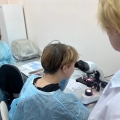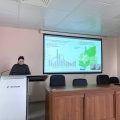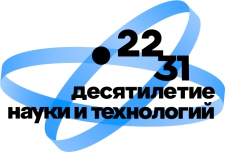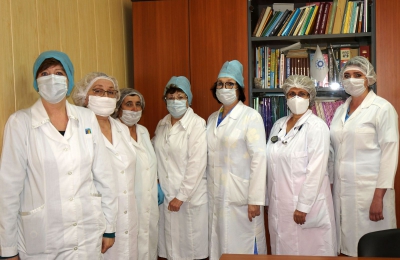On the development of a DNA biochip prototype for parallel indication of actual pathogens of community-acquired pneumonia
Currently, in the Institution of epidemiology and microbiology named after Academician IN Blokhina of the Federal Service for Supervision of Consumer Rights Protection and Human Welfare, research has begun on the development of a DNA biochip prototype for parallel indication of actual causative agents of community-acquired pneumonia caused by a wide range of bacterial and viral pathogens, including the novel SARS-CoV-2 coronavirus. The development and application in laboratory practice of a diagnostic tool in the format of a DNA biochip will make it possible to carry out a comprehensive differential etiological diagnosis of community-acquired pneumonia, conduct an investigation of outbreak and group morbidity, timely implement anti-epidemic measures, which are necessary to optimize the system of epidemiological surveillance and control of community-acquired pneumonia at the regional and national levels. ...
A DNA biochip is a diagnostic tool based on the determination of a set of the most divergent regions of the genomes of actual bacterial and viral pathogens of community-acquired pneumonia (Mycoplasma pneumoniae, Streptococcus pneumoniae, Chlamydophila pneumonia, Legionella pneumophila, Haemopilus influenzae, respiratory-synaptic virus 1 2, 3 and 4 types, coronaviruses, rhinoviruses, adenoviruses of groups B, C and E), which allows the detection of up to 12-14 infectious agents in various biological substrates (sputum, blood, bronchoalveolar lavage, saliva).
A biochip is an express test that makes it possible to choose the only correct diagnostic option. It looks like a small plate, 25x75 mm in size, on which short oligonucleotide probes are artificially synthesized to determine the "genetic portrait" of the pathogens of community-acquired pneumonia. A DNA biochip is not implanted into the human body; samples of biomaterial are taken from a patient in a medical organization and sent to a laboratory, where the presence of one or another infectious agent in the sample is determined using a biochip.
As part of the research, a protocol for sample preparation of various types of biological material will be developed for the detection of pathogens of community-acquired pneumonia using a DNA biochip being developed at the institute, and the accuracy of the results obtained will be assessed in comparison with the results of the polymerase chain reaction. The testing of the obtained DNA biochip on model and clinical samples of patients is planned in 2023–2024.
On the study of the antiviral activity of individual probiotic strains of lacto- and bifidobacteria
Currently, the world scientific community is of great interest to the question of the interaction of probiotic bacteria of the genera Lactobacillus and Bifidobacterium with viruses, in connection with their use for the prevention and treatment of viral infections.
Scientists of the Institution of epidemiology and microbiology named after Academician IN Blokhina of the Federal Service for Supervision of Consumer Rights Protection and Human Welfare studied the antiviral activity of six industrial probiotic strains - L. plantarum 8 RA 3, L. fermentum 39, L. fermentum 90 TC-4, B. bifidum 1, B. bifidum 791 and B. longum 379, which form the microbial basis of liquid probiotic dietary supplements for food of the LB-complex group ("LB-complex", "LB-complex L", "LL-complex"), developed and produced at the institute (certificates of state registration RU .77.99.88.003.E.000946.01.15, RU.77.99.88.003.E.002522.06.18; RU77.99.88.003.R.003638.10.19).
Employees of the Institution of epidemiology and microbiology carried out work to study the interaction of L. plantarum 8 RA 3 and L. fermentum 39 strains with rotaviruses. It has been established that L. fermentum 39 cells are capable of adsorbing rotavirus particles on themselves, which makes it possible to scientifically substantiate a new aspect of the use of probiotics, including this strain, in acute gastroenteritis caused by human rotaviruses.
The results of the research carried out were formalized in a scientific article, which was published in the journal "Microbiology": Solovyova I.V., Novikova N.A., Tochilina A.G., Belova I.V., Kashnikov A.Yu., Sashina T.A. ., Zhirnov V.A., Molodtsova S.B. Probiotic strain Lactobacillus fermentum 39: biochemical properties, genome features, antiviral activity // Microbiology. - 2021. - T. 90, No. 2. - P. 215–222. (DOI: 10.31857 / S0026365621020142).
Employees of the Institution of epidemiology and microbiology, together with scientists from the State Scientific Center for Virology and Biotechnology "Vector" of the Federal Service for Supervision of Consumer Rights Protection and Human Welfare (Novosibirsk), analyzed the complete genome of probiotic strains L. plantarum 8 RA 3, L. fermentum 90 TC-4, L. fermentum 39 , B. bifidum 791, B. bifidum 1, B. longum 379 and study of their activity against viruses of highly pathogenic influenza A - A / Lipetsk / 1V / 2018 (H1N1 pdm09) (EPI_ISL_332798), A / common gull / Saratov / 1676 / 2018 (H5N6) (EPI_ISL_336925) and SARS-CoV-2 virus strain Australia / VIC01 / 2020 (GenBank: MT007544.1). As a result, it was confirmed that the antiviral activity is a strain-specific trait, and it was found that the strains L. fermentum 39, L. fermentum 90 TC-4 and B. bifidum 791 exhibit pronounced activity against influenza A viruses in MDCK cells. Activity against SARS-CoV-2 virus was demonstrated only by L. fermentum strain 90 TC-4 in VERO cells. Thus, it was proved that the strains L. fermentum 39, L. fermentum 90 TC-4 and B. bifidum 791 have a pronounced antiviral activity, and probiotics containing these strains can be used to prevent diseases caused by rotaviruses, influenza A viruses and the SARS-CoV-2 virus.
It is advisable to use medicines and dietary supplements containing these strains in complex programs for the treatment and rehabilitation of patients with viral infections. The results of the research were formalized in a joint scientific article, which was published in the foreign journal "Biomed Research International" Soloveva IV, Ilyicheva TN, Marchenko V.Yu., Pyankov OV, Tochilina AG, Belova IV, Zhirnov VA, Bormotov NI, Skarnovich MO, Durymanov AG, Molodtsova SB, Filippova EI, Ovchinnikova AS, Magerramova AV, Ryzhikov AB, Maksyutov RA Genome Features and In Vitro Activity against Influenza A and SARS-CoV-2 Viruses of Six Probiotic Strains // BioMed Research International. - 2021. - V. 2021. - ID 6662027, 11 p. (https://doi.org/10.1155/2021/6662027).
Currently, the joint work of Institution of epidemiology and microbiology and State Scientific Center of Virology and Biotechnology is to study the antiviral activity of production-promising probiotic strains of lactobacilli isolated from healthy people of various age groups, from the collection of the Institution of epidemiology and microbiology against rotaviruses, noroviruses, highly pathogenic influenza viruses and various genovariants of the SARS-CoV-2 virus.
Organization of laboratory research and monitoring of COVID-19 at the institute
Specialists of the scientific laboratories of the Institute, on the basis of scientific and methodological centers functioning on their basis, including the Regional Scientific Methodological Center for Monitoring the Pathogens of Infectious and Parasitic Diseases of II-IV Pathogenicity Groups of the Volga Federal District, health authorities and Rospotrebnadzor institutions are provided with advice and practical assistance in assessing the epidemiological situation on incidence of COVID-19, conducting and improving laboratory diagnostics of SARS-CoV-2, expert diagnostic, screening and verification studies are being carried out.
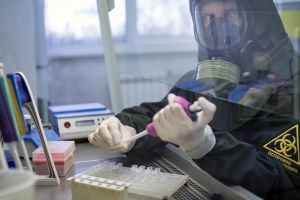 |
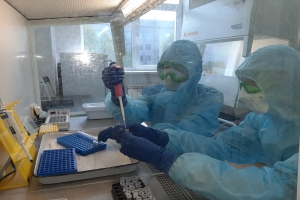 |
To provide assistance to the practical health care of the Nizhny Novgorod region, the Institute temporarily transferred the building of its structural unit - the clinic of infectious diseases at the disposal of the GBUZNO "Infectious Hospital No. 2" to expand the bed capacity and provide medical care to patients with coronavirus infection, including by doctors, nurses and junior medical personnel Institute.
In the period from 01/29/2020 to 03/29/2020, the institute provided practical and advisory and methodological assistance to FBUZ TsGiE nine subjects of the Volga Federal District (Kirov, Ulyanovsk, Penza, Nizhny Novgorod regions, the Republic of Tatarstan, Mari El, Mordovia, the Chuvash Republic, the Udmurt Republic ), as well as the Ivanovo region and the Komi Republic. PCR diagnostics of 742 samples of clinical material from 403 people (14 - patients, 85 - contact, 127 - healthy, 4 - re-examined) with a negative result was carried out. For the first time SARS-CoV-2 RNA was detected on 03/30/2020 in a sample of a respiratory smear from a patient with community-acquired pneumonia, admitted from the FBUZ "TsGiE in the Ivanovo region".
On behalf of the Federal Service (dated 27.03.20, No. 02 / 5325-2020-27 "On the organization of laboratory diagnostics of COVID-19"), the Institute provides practical assistance to healthcare institutions and Rospotrebnadzor of the Ivanovo region in conducting screening PCR studies for coronavirus infection, for the entire period, more than 3000 studies were carried out.
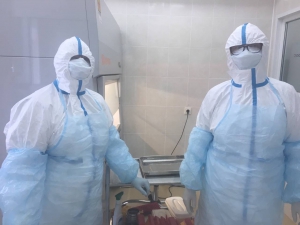 |
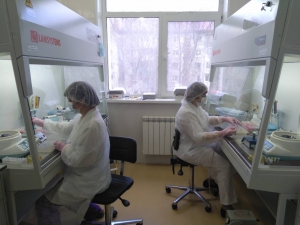 |
In total, on June 21, 2021, the laboratories of the institute carried out PCR studies of 40,743 samples of biological material (nasal and oropharyngeal swabs, blood, blood serum, urine, BAL fluid, sectional material) from 40,283 people. Of these: 10068 - sick, 3028 - contact, 12007 - healthy, 3 - dead, 2278 - medical workers, 1381 - social workers. institutions, 131 - citizens of the PRC, 8 - returned from business trips, 4686 - re-examined. In particular, in order to verify the diagnosis of COVID-19, 6 693 respiratory smears from patients of medical organizations in Nizhny Novgorod and the Nizhny Novgorod region were examined. Over the entire study period, SARS-CoV-2 coronavirus RNA was detected in 10,429 samples of clinical material, the detection rate was 25.6%.
As part of the monitoring of population immunity to the new coronavirus infection, the NNIIEM examined the employees of the institute and law enforcement agencies, as well as the wards of the mercy center and the neuropsychiatric boarding school, vaccinated against COVID-19, for the presence of antibodies to the SARS-CoV-2 virus of the IgG class. A total of 781 people were examined, of which 83.9% have IgG antibodies to the SARS-CoV-2 virus.
In pursuance of the order of Rospotrebnadzor dated February 19, 2021, No. 56 "On the improvement of molecular genetic monitoring of strains of the causative agent of a new coronavirus infection", samples from 6 subjects of the Volga Federal District are sent to the institute for research by fragment sequencing. In total, as of June 21, 2021, 2,278 studies were carried out at the Institute. The results of genotyping made it possible to identify 81 isolates of SARS-CoV-2 related to mutant strains.
Personnel training. Educational component in the COVID-19 epidemiological surveillance system
25 employees of the Institute underwent advanced training on the topic “Actual problems of microbiology. Safety of work with pathogens of III-IV pathogenicity groups ”(72 hours) with an in-depth study of epidemiological, immunological and other aspects related to the new coronavirus infection COVID-19.
Six employees received additional professional education in the system of continuing medical education (CME) in the form of short-term on-line courses (18 hours) on the clinical aspects of COVID-19, certificates were received.
Regular informing of all scientific staff of the institute with modern guidelines, instructions and orders of the Rospotrebnadzor service on current aspects of prevention, diagnosis and epidemiology of COVID-19 has been organized.
The program of additional professional education (advanced training in the form of an internship at the workplace) "Indication of bacterial and viral pathogens - causative agents of human infectious diseases by PCR method" (18 hours) was developed and approved by the Scientific Council of the Institute. Information about a possible internship was sent to all interested organizations of the Volga Federal District.
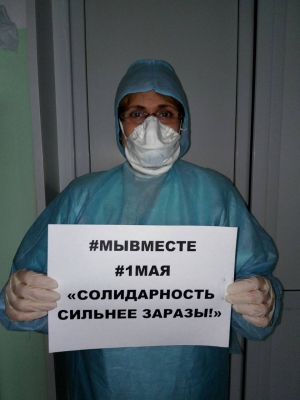 |
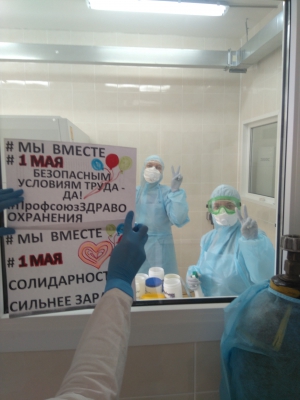 |

